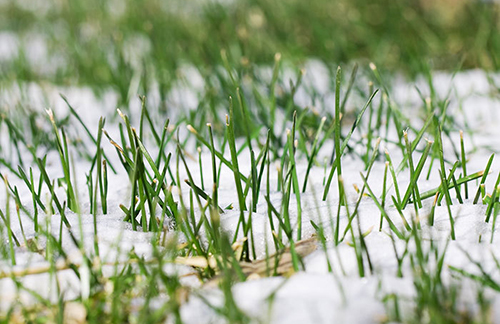If you're from Akron, Canton or Cleveland, Ohio, you know that February and March are two of the longest months of the year— and February has only 28 days. We've already had a few months of winter, but the snow just keeps falling.
It may not feel like it, but spring is just around the corner. Even so, plenty of you may be wondering what you should be doing in terms of winter lawn care. Although the ice, cold and snow may stop you from the kind of lawn care you’re used to, there are still some winter grass maintenance tasks to undertake now that will ensure that you’re ready when the weather finally turns.
Should I Treat My Lawn in the Winter?
While there is actually plenty of winter lawn care you can do, many people want to know whether they should be treating or fertilizing in the winter as well.
We recommend aerating and seeding your lawn in the fall to give your grass the best preparation for a long winter’s nap. That’s because fall in our area provides a good combination of mild soil temperatures and cool air temperatures, which are great conditions for growth. Late fall (October to December) is also the best time to put down any “winter feed” for your lawn.
By the time the snow flies, you can focus on winter lawn maintenance until it’s time to tackle your spring lawn care.
See our tips below for more things you can do to take care of your lawn in the winter.
Sharpen Your Lawn Care Tool Blades
One of our best winter lawn care tips is to make sure your tools and equipment are in good shape. After a full season of use and a winter of rest, the blades on your lawn care equipment probably aren’t what they used to be. We recommend sharpening mower, clipper and weed wacker blades before spring arrives and they’ll return to heavy usage. This ensures your equipment will be up to the task of handling your yard’s needs, and you won’t need to scramble to do it at the last minute.
Wash Away Any Salt Residue
Hose down your garage, driveway, sidewalk and even the edges of your lawn to ensure it’s salt free to start the spring. The salt and other de-icing products used to clear roads and sidewalks can accumulate in your lawn over the winter, causing damage to vulnerable grasses.
You might even want to wash off your lawn care equipment. There is so much salt used every winter, and it tends to end up on everything—even if it hasn’t been touched months. Give your late winter lawn a good rinse to flush out salts and prepare your grass to absorb its spring treatments.
Pick Up Yard Debris
Debris such as leaves, sticks and even toys get buried under the snow and sit on your grass all winter long. This close contact can weaken grass and even provide an environment for mold and disease to grow. In late winter, lawn care and leaf clean-up days will provide good preparation for spring.
An early snow melt is a great opportunity to remove debris from your lawn. You can even turn this one into a fun game of pick-up sticks with your children.
Avoid Excessive Foot Traffic On Your Lawn
It’s tempting to take the family out to play in the lawn for hours when the snow melts. But the ground is still very wet and grass is still dormant. Too much activity in one area could dig up your lawn or kill the grass.
Also avoid parking cars, snowblowers or other equipment on your grass over the winter, as they could damage the lawn. Same goes for shortcuts and foot traffic across your lawn, as that can weaken the grass.
Sign Up for our Deluxe Lawn Care Package
One of the best ways you can care for your lawn is to let us help you! Late winter is the perfect time to sign up for Grass Master’s Deluxe Lawn Care Package. This lawn service package includes six treatments from March to November and ensures your lawn will look beautiful all season long. Contact us today for a quote.

